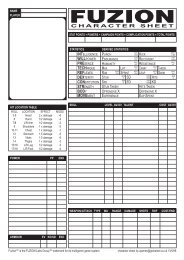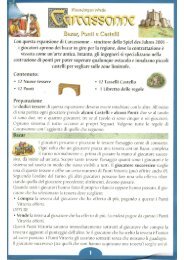How to Play Pendragon™ Basic Overview of Rules
How to Play Pendragon™ Basic Overview of Rules
How to Play Pendragon™ Basic Overview of Rules
You also want an ePaper? Increase the reach of your titles
YUMPU automatically turns print PDFs into web optimized ePapers that Google loves.
<strong>How</strong> <strong>to</strong> <strong>Play</strong> Pendragon<br />
Demonstration Summary<br />
The Encounter<br />
This is a typical encounter in Pendragon: a knight is riding through the<br />
forest along the King’s Road, when he is challenged by an opposing knight<br />
<strong>to</strong> a potentially deadly duel. This summary is for prospective cus<strong>to</strong>mers or<br />
new players <strong>to</strong> introduce them <strong>to</strong> the basic rules and concepts.<br />
Tell the player they are a knight in King Arthur’s Britain, and hand them<br />
the card for Sir Caradoc. You will be the gamemaster, so review the Blue<br />
Knight card. Explain Caradoc was travelling from Eboracum (York) on his<br />
way <strong>to</strong> Camelot for a <strong>to</strong>urnament when he happens upon a bridged stream.<br />
Beyond it is a knight’s pavillion (a large, ornate tent), with a pair <strong>of</strong> fine<br />
warhorses tied <strong>to</strong> a tree and a shield hanging from a tree limb. A squire<br />
stands on the bridge, holding his hand up for Caradoc <strong>to</strong> s<strong>to</strong>p. The knight<br />
himself is not visible, but may be within the pavilion.<br />
Ask the player <strong>to</strong> roll Heraldry <strong>to</strong> recognize the coat <strong>of</strong> arms from the<br />
squire’s surcoat or the shield hanging in the tree. (Secretly add +5 <strong>to</strong> his<br />
skill for the knight’s 5,000 Glory). If he succeeds (rolls less than 12), tell<br />
the him Caradoc has never seen or heard <strong>of</strong> this knight’s arms, but from the<br />
fleur-de-lis, it is obvious he is French. If they Critically Succeed (roll 12<br />
exactly), they would know by the flower and the crowns this knight likely<br />
serves the French King Claudas himself, and is even perhaps a relative!<br />
“Hold Sir Knight!”<br />
Ask the player if they will hold, as the squire is asking. If the player wants<br />
<strong>to</strong> flee or force a way across (riding past or riding down the unarmored<br />
squire) ask the player <strong>to</strong> reconsider such unchivalrous behavior. If they<br />
persist, have the player roll their Cowardly or Cruel traits. If he fails, tell<br />
him Caradoc’s ears burn red at the thought <strong>of</strong> fleeing or dishonorably<br />
attacking a mere squire, and he chooses instead <strong>to</strong> hold. If he succeeds, tell<br />
him <strong>to</strong> check the Trait, for word will get back <strong>to</strong> court <strong>of</strong> Caradoc’s<br />
behavior. The event is over, as the squire shouts slurs <strong>of</strong> derision at the<br />
coward, or leaps from the bridge in<strong>to</strong> the river as the knight rides past.<br />
The Challenge<br />
If Sir Caradoc holds as asked, the squire calls out in French <strong>to</strong> the pavilion.<br />
Out <strong>of</strong> the tent comes a finely armored Blue Knight, who reaches for his<br />
shield, and mounts a warhorse. The squire tells Caradoc his lord has heard<br />
<strong>of</strong> the prowess <strong>of</strong> the British knights, and wishes <strong>to</strong> see if they are indeed<br />
worthy <strong>of</strong> their reputation. He must fight his lord knight <strong>to</strong> the best <strong>of</strong> three<br />
charges <strong>of</strong> the lance, and three sword blows given on foot. This is the<br />
condition before any knight may pass the bridge.<br />
Point out <strong>to</strong> the player this does not necessarily mean a fight <strong>to</strong> the death,<br />
though the weapons are not rebated, and it looks unlikely this strange knight<br />
will be pulling his blows. It may result in grievous wounds, or even death,<br />
or it might be rather bloodless, depending on Caradoc’s skill and luck.<br />
The squire assists his lord by leading his warhorse by the bridle across the<br />
bridge <strong>to</strong> a field <strong>of</strong> grass nearby. The Blue Knight himself is silent. Any<br />
attempt at dialogue by Sir Caradoc is answered by the squire. Explain, out<br />
<strong>of</strong> character, knowing another knight’s identity was <strong>of</strong>ten thought <strong>to</strong> be a<br />
key <strong>to</strong> defeating him, and so keeping one’s name secret was <strong>of</strong>ten a tactic<br />
<strong>to</strong> rattle an opponent’s nerves. Revealing one’s identity was <strong>of</strong>ten a<br />
condition <strong>to</strong> accept surrender or show friendship. When both knights are in<br />
position, the squire withdraws <strong>to</strong> a position <strong>to</strong> signal both <strong>to</strong> charge.<br />
Three Jousts with a Lance<br />
Each knight must make three opposed Lance skill rolls. Caradoc has a 15<br />
skill; the Blue Knight has an 18. Each round, determine the skill roll result,<br />
roll damage, and subtract the target’s armor. Both knights are on Chargers,<br />
so both roll 6d6 damage. Both wear Full Plate and both are “Chivalrous”<br />
knights, so both subtract 19 points <strong>of</strong> damage (Armor 16 + Chivalry Bonus<br />
3), or 25 <strong>to</strong>tal if they succeed and get their shield (+6) up.<br />
Example:<br />
Caradoc spurs his horse forward, and rolls an 11, but the Blue Knight rolls a<br />
12, barely beating him! The Blue Knight rolls 6d6 for damage and scores a<br />
pitiful 18. This does not even scratch Caradoc, and the British knight shakes<br />
the glancing blow <strong>of</strong>f easily.<br />
In the next charge, Caradoc rolls a 13, succeeding, and the Blue Knight<br />
rolls a 20 -- a fumble! Caradoc rolls 24 points <strong>of</strong> damage, and the Blue<br />
Knight’s armor does not s<strong>to</strong>p it all (only 19 points), nor does he get <strong>to</strong> use<br />
his shield. He takes a 5 point wound. In addition, the gamemaster rules the<br />
Blue Knight’s saddle girth bursts with the blow, throwing him <strong>to</strong> the ground.<br />
The gamemaster rolls 1d6, and the Blue Knight takes 6 more points <strong>of</strong><br />
damage, landing with an loud “Oo<strong>of</strong>f!”<br />
The squire runs <strong>to</strong> his lord. The Blue Knight waves him <strong>of</strong>f, telling him <strong>to</strong><br />
quickly fetch the saddle from the second warhorse. After a short break, the<br />
Blue Knight remounts and faces Caradoc for a last charge. Caradoc rolls<br />
12, but the Blue Knight rolls 14, again landing the best blow. Against 27<br />
damage, Caradoc gets <strong>to</strong> subtract 25 points for his Armor (14), his Chivalry<br />
Bonus (3), and Shield (6), so takes a 2 point wound. Though Caradoc landed<br />
the best blow during the joust, he recognizes he was scored against twice by<br />
the Blue Knight. So far, no one has proved outright superiority, but by the<br />
rules <strong>of</strong> the contest the Blue Knight is nominally ahead.<br />
Three Blows <strong>of</strong> the Sword<br />
Assuming neither has been incapacitated, both knights then both dismount<br />
<strong>to</strong> fight on foot for three more rounds, this time using Sword skill. Both<br />
knights have a skill <strong>of</strong> 16. For damage, they use their own Damage rating.<br />
The burly Caradoc has 6d6. For the smaller Blue Knight, this is only 5d6.<br />
Example:<br />
Sir Caradoc is a giant <strong>of</strong> man. His shadow falls on the Blue Knight like a<br />
cloud upon a lake. Both maneuver about each other for a few breaths, then<br />
unleash themselves with fury at each other.<br />
Caradoc rolls an 11, and the Blue Knight rolls a 3.Caradoc scores only 21<br />
points <strong>of</strong> damage, so his foe looks unfazed. Indeed, the Blue Knight turns the<br />
attack back at Caradoc. Rolling in the next round, Caradoc gets an 18 --<br />
failing! -- while the Blue Knight succeeds with a modest 5. Rolling 20 points<br />
<strong>of</strong> damage, Caradoc feels another slight wound for 1 point.<br />
Both knights realize they are facing someone <strong>of</strong> near equal skill, though<br />
Caradoc feels much more comfortable facing this knight on foot rather than<br />
on horseback. They now take their time, for this is the last blow, and both<br />
wish <strong>to</strong> make it count. The Blue Knight succeeds again, rolling a 15 against<br />
Caradoc’s 3. <strong>How</strong>ever, the smaller Blue Knight only rolls 5d6, getting an<br />
18. Caradoc barely feels it at all, but hears the clang audibly.<br />
At this point, the combat ends. The Blue Knight has won two <strong>of</strong> the lance<br />
charges, and two <strong>of</strong> three sword blows. The Blue Knight raises his sword in a<br />
salute <strong>of</strong> his worthy opponent. Caradoc, however, silently considers he<br />
could have taken him in a fight <strong>to</strong> the uttermost...<br />
Honorable & Glorious Endings<br />
Assuming neither has been incapacitated, regardless <strong>of</strong> who won or lost,<br />
the Blue Knight <strong>of</strong>fers <strong>to</strong> befriend Caradoc as long has he has fought<br />
honorably. His squire uses his First Aid <strong>of</strong> 14 skill <strong>to</strong> tend <strong>to</strong> any wounds.<br />
The Blue Knight will say his name is Sir Norman St. Germaine, a knight<br />
<strong>of</strong>the French King Claudas’ court. He would be glad <strong>to</strong> go <strong>to</strong> Camelot if<br />
Caradoc extends an invitation. If Sir Norman was defeated, he will also<br />
<strong>of</strong>fer his second warhorse <strong>to</strong> Caradoc as an honorific gift.<br />
Caradoc is awarded 25 points <strong>of</strong> Glory if he defeats this famous knight, or<br />
250 points if he kills him.





